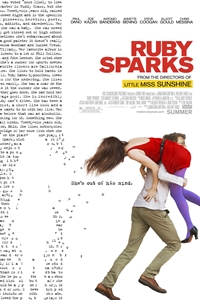Ruby Sparks (R) ★★★½
 ''You can make her do anything you want… For men everywhere, tell me you're not going to let that go to waste.''
''You can make her do anything you want… For men everywhere, tell me you're not going to let that go to waste.''
It's a chilling turn of phrase that Chris Messina's character Henry utters when he meets the woman that his brother Calvin wrote into being. Calvin, played by Paul Dano, is a frustrated writer, but more than that, a writer who published to great acclaim at a young age who has yet to do anything since. He begins writing a character named Ruby Sparks, and as he falls in love with his creation, he can't stop writing. It's exhilarating and addictive. Played by Dano's real-life girlfriend Zoe Kazan, Ruby Sparks is a one-dimensional male fantasy, a cutesy young woman on roller skates… until she appears in his kitchen one morning. Calvin quickly learns that even though he can control her with a few taps on his typewriter, Ruby has an ever-changing will of her own.
Ruby Sparks is written by Kazan with the sort of bite that a trailer can't be tied up with a neat little bow. There is gorgeous California sunshine, an airy house in a hip part of Los Angeles, the trendy Figaro café where Calvin finds out that other people can see Ruby, and a delightful interlude with Calvin's hippie mother and stepfather, played by Annette Bening and Antonio Banderas. As gorgeous and gleeful and wide-eyed as Ruby is and as much as Calvin adores her, the relationship develops and changes, even as he succumbs to the temptation to rewrite her. Calvin, an essentially insecure man, unravels and becomes more and more of a controlling jerk until he's faced with the truth of how far he's willing to go to keep Ruby from leaving him. It becomes sad and frankly disturbing, with an admirably raw performance by Kazan that lingers.
While Ruby Sparks serves as an interesting commentary on wish fulfillment in fiction writing, its juicy subtext is far more important. Under the surface, the film delves into how we're culpable for the way we see our lovers and how we want to change them or make them something they're not. Eventually, Calvin has to decide whether or not he wants to continue editing Ruby to fit his specifications; he has to face that that means about him as a person and as a man. It's Pygmalion with a feminist twist. We see plenty of dumb romantic comedies about women tricking men into changing, but it seems like there's an endless parade of indie films written by men about loveably girly women whose only reason for being is to act as a catalyst for the man's emotional growth. While this is absolutely true in some ways for Ruby and Calvin, there's a meat to the script and Kazan's performance that makes ''Ruby'' rise to the top. There are plenty of words (or that overused phrase) we can use to describe Ruby, but in the end, Calvin wrote those traits into her, and these are details that Ruby shucks off as she grows. Similarly, as women grow up, we learn we can (and have to) stop performing tricks to become the person our significant other wants or sees in us.
Without revealing too much, the end of Ruby Sparks could be read a number of ways. On one hand, it is a bit of a misstep that undermines the general thrust of the story, but it could also be seen as simply a happier, more hopeful ending. Romantics will find it satisfying, but those hoping for Ruby's full emancipation might find it lacking.
This is the first film for directors Jonathan Dayton and Valerie Faris since 2006's Little Miss Sunshine, and although they have much in common — including Dano — Ruby is a darker, unrulier movie. The idea of movie-goers being led in to see Ruby because of Faris and Dayton's names or because of the trailer is delightful, because they're going to get a little bit of a different experience than they're prepared for.
[Full disclosure: I interviewed Zoe Kazan for a profile in the August/September issue of BUST magazine.]
Hollywood.com rated this film 3 1/2 stars.
To get the full Quicklook Films experience, uncheck "Enable on this Site" from Adblock Plus
box office top 10

Civil War Released: April 12, 2024 Cast: Kirsten Dunst, Wagner Moura 11.1M

Abigail Released: April 19, 2024 Cast: Melissa Barrera, Dan Stevens 10.2M

Godzilla x Kong: The New Empire Released: March 29, 2024 Cast: Rebecca Hall, Brian Tyree Henry 9.5M

The Ministry of Ungentlemanly Warfare Released: April 19, 2024 Cast: Henry Cavill, Eiza Gonzalez 9M

Spy x Family Code: White Released: April 19, 2024 Cast: Takuya Eguchi, Saori Hayami 4.9M

Kung Fu Panda 4 Released: March 8, 2024 Cast: Jack Black, Viola Davis 4.6M

Ghostbusters: Frozen Empire Released: March 22, 2024 Cast: Paul Rudd, Carrie Coon 4.4M

Dune: Part Two Released: March 1, 2024 Cast: Timothée Chalamet, Rebecca Ferguson 2.9M

Monkey Man Released: April 5, 2024 Cast: Dev Patel, Sikandar Kher 2.2M

The First Omen Released: April 5, 2024 Cast: Nell Tiger Free, Bill Nighy 1.7M






